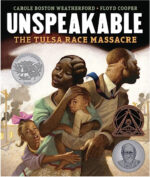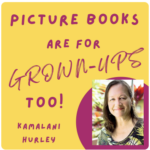
Welcome to a new occasional series about learning from mentor text picture books!
I love picture books, those wildly colorful, wonderfully imaginative works of children’s literature. Some picture books are so good that every time I read one, I always come away with something new — a fact I didn’t know, an exciting idea I hadn’t thought of, a point of view I hadn’t considered — in a small, easy-to-read, beautifully illustrated package. As a writer, I use mentor texts to improve my storytelling skills.
What are mentor texts?
These are well-written books we can use as models to become better readers and writers. Mentor texts allow us to experiment, to take risks, and to test new ideas and points of view.
 There is an army of us authors (and teachers, parents and grandparents, librarians, and students) devoted to and inspired by picture books. Just listen to the popular podcast Picture Books are for Grown-ups, Too led by my friend, the wonderful Patrice Gopo. Her guests are writers who discuss mentor texts, fiction and non-fiction, of all kinds.
There is an army of us authors (and teachers, parents and grandparents, librarians, and students) devoted to and inspired by picture books. Just listen to the popular podcast Picture Books are for Grown-ups, Too led by my friend, the wonderful Patrice Gopo. Her guests are writers who discuss mentor texts, fiction and non-fiction, of all kinds.
Like these writers, I also study mentor texts to learn the tricks and tips to improve my own writing. I focus on HOW a story is told, including plot devices, page turns, and lyrical language.
But what if I can’t find mentor texts about the topics I want to write about?
That’s the challenge I face. I write about my Native Hawaiian community’s difficult history, and mentor texts on our generational trauma written by ‘ō’iwi authors are pretty much non-existent.
If, like me, finding mentor texts for your difficult topics is a struggle, it may help to realize that our communities are not the only ones that face historical challenges. Picture books by successful kidlit authors such as Carole Boston Weatherford, Traci Sorrell, Rob Sanders, Sun Yung Shin, and others can inspire and instruct us.
That’s what this series is about — the search for mentor texts that demonstrate ways in which difficult / sensitive topics can be handled with care yet honestly for young readers, and thus inspire us to write our own stories.
Which mentor text inspired me to write my own picture book stories?
 For me, the influential picture book that helped me to write my first two non-fiction manuscripts is UNSPEAKABLE, THE TULSA RACE MASSACRE by Carole Boston Weatherford (Lerner, 2021.) In fact, I love this book so much that I chose it to speak about when I was a guest on Patrice’s podcast.
For me, the influential picture book that helped me to write my first two non-fiction manuscripts is UNSPEAKABLE, THE TULSA RACE MASSACRE by Carole Boston Weatherford (Lerner, 2021.) In fact, I love this book so much that I chose it to speak about when I was a guest on Patrice’s podcast.
The book makes this difficult history story accessible to kids. Ms. Weatherford does this in deliberate, ingenious ways:
- employing the familiar refrain, “Once upon a time,” to gently orient readers to the city and the residents’ accomplishments,
- making use of measured yet musical language, such as internal rhyme and alliteration,
- incorporating the everyday activities of residents with the names of actual businesses, such as the soda fountain at Williams Confectionery, making the story more relatable to today’s young readers,
- presenting the inciting incident with the words, “All it took,” a devastating moment in the book,
- choosing words that demonstrate the violence of the mob, resulting in a clear-eyed telling that never condescends or insults the reader’s intelligence,
- ending with a call to action and a scene of hope.
Because I’m such a fan-girl, I contacted Ms. Weatherford through her website to thank her for her incredible book. Her response was a gracious email encouraging me to stick with it:
Thanks so much for reaching out. I love Hawaii but hate what was done to the indigenous people. Please document that history.
Absolutely!
 What are your mentor texts? Are you working on difficult, challenging topics? Which picture books inspire you? Email me kamalani3@gmail.com and let’s talk books!
What are your mentor texts? Are you working on difficult, challenging topics? Which picture books inspire you? Email me kamalani3@gmail.com and let’s talk books!


